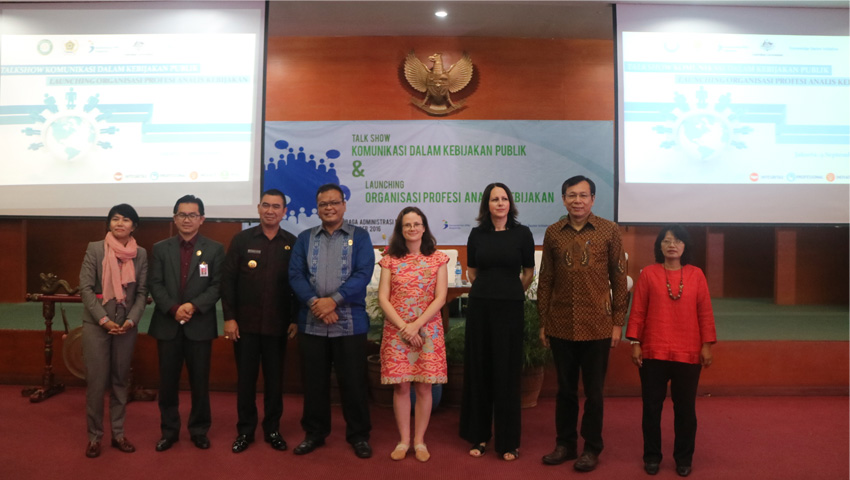Every year, Indonesia spends trillions of rupiahs creating and developing public policies in the form of laws, government regulations and regulations at the local level[1]. However, many policy products are revoked by the National Government because they are not in line with higher-level regulations and do not represent the interests of the people. This year, the President of Indonesia, Joko Widodo, has ordered the revocation of 3000 problematic local regulations. Cancelling thousands of local regulations leads to inefficient use of the State budget.
Improvements in the public policy development process are urgently required to promote the effectiveness of policy implementation and state budget efficiency. This is the underlying reason for establishing the Policy Analyst Functional Position (JFAK), a new functional position in national and local government institutions based on the Minister of State Apparatus and Bureaucratic Reform (PAN RB) Regulation Number 45 Year 2013. The strategic role of JFAK is to drive the improvement of public policy in Indonesia by analysing policy problems and bridging policy and analysis results in the policy-making process.
The State Administrative Institution (LAN) is the supervising institution for JFAK and is mandated to facilitate the establishment of an organization, known as the Indonesian Policy Analyst Association or Asosiasi Analis Kebijakan Indonesia (AAKI). This was inaugurated on 9 September 2010 in Jakarta, at a Seminar on Communication in Public Policy. Erna Irawati, the head of the Centre for Policy Analyst Advancement, PUSAKA-LAN, said that the existence of JFAK in every ministry and institution, both at the national and sub-national level, would contribute to better quality public policy in Indonesia. They are trained to have both analytical and political capacity to provide high quality policy recommendations and advocate specific policy options and solutions. AAKI will serve as an interactive forum for policy analysts from government agencies, both at the national and local level. This association will also develop ethics and a code of conduct for the profession, and certification criteria as mandated in the Minister of PAN RB Regulation Number 45 Year 2013.
“AAKI is a permanent and independent professional association for policy analysts in all levels of government throughout Indonesia,” Dr Adi Suryanto, the head of LAN, said. “Upon its establishment, the association must support its members to develop their capacity, transfer knowledge and create ethics and a code of conduct,” he added during his keynote speech at the inauguration of AAKI and the core management of this organization.
The Deputy of the Policy Study Division of LAN, Dr Muhammad Taufiq, noted that PUSAKA-LAN had developed curriculum and training modules and organized Training of Trainers in Jakarta and Melbourne. One hundred and fifty nine policy analyst candidates (CAK) from various ministries and institutions, both at the national and local level, have been recommended to become policy analysts through an in-passing process. Policy analysts are expected to continually improve their capacity through self-mastery and team learning, either within their respective ministries and institutions, or facilitated by the association.
Dr Greta Nabbs-Keller from the University of Queensland was at the AAKI inauguration to share lessons learned from Australia on the role of policy analysts in communicating public policy. She said effective policy implementation was a very difficult thing to achieve. “Public policy must be coherent and clear. Coordination between institutions is very important and sectoral ego must be minimized,” Dr Nabbs-Keller said. She added that policy making must involve stakeholders in order to avoid resistance from various parties.
The Vice Head of the Indonesian Chamber of Commerce and Industry (Kadin), Raden Pardede, highlighted the Indonesian Tax Amnesty Law as an example of public policy failure. Mr Pardede said the design for such particular policy was made in a hurry, with a weak impact and benefit-risk analysis, limited stakeholder consultation, and lack of socialization on the law to the public. Meanwhile, the Mayor of Malang, popularly known as Abah Anton, explained that the key to success for various programmes in Malang City was communication and dialogue between the Government, community, media, academics and the business world.
The Australian Government, through the Knowledge Sector Initiative (KSI), supports the establishment of JFAK and AAKI, which will serve as a space for interaction and knowledge exchange among policy analysts in Indonesia. Joanne Sharpe from the Australian Embassy in Jakarta said the increasing complexity of public policy required the role of policy analysts. KSI has cooperated and supported LAN in building the capacity of policy analysts and strengthening interaction between policy analysts and policy makers to promote a wider scale evidence-based public policy in Indonesia.
Further information can be accessed at: https://pusaka.lan.go.id/
[1] Sourced from the Academic Paper on Policy Analyst Functional Position, prepared by the State Administrative Institution, Centre for Policy Management Study, and Magister of Public Administration, Gadjah Mada University. For the complete paper, see: https://www.academia.edu/8978931/Academic_Paper_of_Policy_Analyst_Functional_Position).






